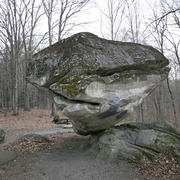River Silicon Stoichiometry FY26 Working Group
Flood Impacts FY26 Working Group
New Data for Hazards Models FY26 Working Group
Metal Subsidy Stress FY26 Working Group
Water Cycle Synchrony (CUAHSI) FY26 Working Group
Contaminant Food Webs FY26 Working Group
John Wesley Powell Center for Analysis and Synthesis
Offering the opportunity for emergent knowledge in Earth system science through collaborative analysis and synthesis.
News
John Wesley Powell Center for Analysis and Synthesis Newsletter, Volume 9 - Vol. 9 | Issue 1
John Wesley Powell Center for Analysis and Synthesis Newsletter, Volume 9 - Vol. 9 | Issue 1
Powell Center Working Groups - Class of 2026
Powell Center Working Groups - Class of 2026
Synthesis Skills for Early Career Researchers Course is Open
Synthesis Skills for Early Career Researchers Course is Open
Publications
Hierarchical mixture models and high-resolution monitoring data can inform siting and operational strategies to mitigate bat fatalities at wind turbines Hierarchical mixture models and high-resolution monitoring data can inform siting and operational strategies to mitigate bat fatalities at wind turbines
Bats provide critical ecosystem services, but bat fatalities due to wind energy development may imperil some bat populations. Statistical models are used to estimate the total fatalities that occur based on carcasses observed during monitoring surveys. Current models often estimate fatalities aggregated across species, time, and/or turbines, but fall short of reliably informing siting...
Surface variable‐based machine learning for scalable arsenic prediction in undersampled areas Surface variable‐based machine learning for scalable arsenic prediction in undersampled areas
In the United States, private wells are not federally regulated, and many households do not test for Arsenic (As). Chronic exposure is linked with multiple health outcomes, and risk can change sharply over short distances and with well depth. Coarse maps or sparse sampling often miss exceedances. Most existing models operate at ∼1 km resolution and use groundwater chemistry or detailed...
Identifying headwater streams across the conterminous United States Identifying headwater streams across the conterminous United States
Headwater streams play critical roles in hydrologic and biogeochemical processes and functions, yet their spatial distribution and land cover context remain poorly understood at continental scales, and no dedicated geospatial dataset exists. Building from a high-resolution conterminous United States (CONUS) hydrography network dataset, we quantified the spatial extent, density, and...
Science
Operationalizing the use of millennial-scale geologic constraints for testing and improving modern seismic hazard models
This Powell Center working group will improve the National Seismic Hazard Model by developing and operationalizing the first comprehensive set of geologic data on past earthquake shaking intensity.
A spatially explicit framework to assess the risk of aquatic contaminants to insectivorous birds
Aquatic contamination can reduce both the quantity and quality of nutritionally important aquatic insect prey and has been implicated in global declines of insectivorous birds. Yet hotspots of risk and the relative importance of quantity (that is, prey limitation) versus quality (that is, prey toxicity) remain poorly resolved across the landscape.
Effects of global change on alpine and subalpine ecosystems
Atmospheric nitrogen deposition, changing environmental patterns, and recreation are rapidly altering high elevation ecosystems. This project will evaluate long-term biogeochemical, hydrological, and ecological trends in Rocky Mountain National Park to understand the causes and rates of change in alpine and subalpine waters, soils, and vegetation. Resource managers of high-elevation, protected...






